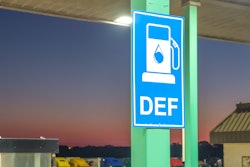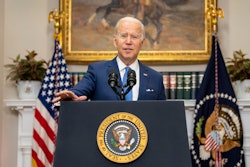The Biden administration on Wednesday proposed suspending the collection of state and federal taxes assessed on gallons of gasoline and diesel fuel, a plan that will cost the Highway Trust Fund approximately $10 billion.
Biden called on Congress to suspend the federal gas tax for three months (through September) and asked states to follow suit or find an alternative that provides similar relief to consumers. A number of states this year temporarily suspended state fuel taxes, but many of those have expired and were not renewed. Illinois and Colorado delayed planned tax and fee increases. Michigan and Minnesota are among the states considering a number of consumer relief measures, including temporary suspensions and pauses on state sales tax on gas to consumer rebates and relief payments.
Federal taxes include excise taxes of 18.3 cents per gallon on gasoline, 24.3 cents per gallon on diesel fuel, and a Leaking Underground Storage Tank fee of 0.1 cents per gallon on both fuels. State taxes vary by state but average about 32 cents per gallon on both diesel and gasoline.
American Trucking Associations President and CEO Chris Spear said his organization opposes the suspension of tax collection, calling it temporary relief that will undo much of the positive momentum of highway infrastructure improvements.
"After months of touting the passage of the well-funded Infrastructure Investment and Jobs Act – a much-needed investment in our nation’s roads and bridges – the Biden Administration wants to cut that same highway system’s primary source of funding with a suspension of the federal fuel tax," he said.
While the suspension of the tax won't add funds into the Highway Trust Fund, Biden called on Congress to ensure the fund remained whole. Citing a $1.6 trillion deficit reduction this year, the White House said Biden believes the tax can be suspended and the cost offset with other unnamed revenues.
However, Truckload Carriers Association President Jim Ward has doubts.
“The Highway Trust Fund is already facing expanding structural deficits and needs greater investment moving forward. Instead, this policy would erode the funding we need to rebuild our nation’s roads and bridges," he said. "Trucking, an industry directly reliant on fuel, unequivocally understands the cost of rising fuel prices. However we do not support short-term solutions at the sacrifice of long-term progress toward a better-funded and more-reliable national infrastructure network.”
Implementing federal or state gas tax holidays, Ward further contended, would "significantly starve the Highway Trust Fund of much-needed financing and directly undermine industry and policymakers’ ability to implement the newly-won infrastructure law."
Spear proposed the administration work toward making the U.S. energy independent, and "stop kissing the ring of Saudi Arabia," he said; renew trade agreements with the European Union and Asian Pacific nations in order to export more American oil and natural gas; and balance the budget. "Stop wasting hard-earned taxpayer dollars on senseless programs that drive up inflation and runaway deficits," Spear added. "Energy independence, trade and a balanced budget. Do that and America wins.”
The suspension of the tax could be risky as refineries and station operators wouldn't be required to pass through the savings, and it is the latest measure the administration has deployed in an ongoing effort to drive down fuel prices, which to date have not worked.
The administration in March announced the release of a one million barrels per day from the U.S. Strategic Petroleum Reserve; rallied international partners in April to release a combined 240 million barrels of oil on the market; expanded access in March to biofuels like E15 – gasoline that uses a 15% ethanol blend; and is currently engaging with oil and refining companies to ask them to to bring forward solutions that increase refinery capacity and output.
Biden's proposal will likely face challenges and headwinds on both sides of the aisle, with Democrats and Republicans each questioning its effectiveness. Sen. Tom Carper (D-Delaware) echoed Spear's concerns, tweeting that the suspension of "the primary way that we pay for infrastructure projects on our roads" is a "shortsighted and inefficient way to provide relief.”
Democrats last month left a gas tax holiday out of a package of bills aimed at curbing gas prices and restoring supplies of baby formula, among other things, mostly citing that any potential benefit didn't outweigh the cost.
'Hard to see real relief for diesel'
"The relief a gas tax holiday would provide would amount to about $15 per month per typical family," Tom Kloza, global head of energy analysis at Oil Price Information Service (OPIS) told CCJ. "I do think it’s all about demonstrating that [Biden] cares about this very stubborn pillar of inflation and is attempting to counter the disingenuous – but very effective – messaging of Republicans. So at least folks will have to declare their opposition on the record. Maybe some more effective measures are possible, including some environmental lenience or speed bumps for exports."
Taxed or not, Kloza expects attention over the second half of the year to shift from gasoline to diesel due to low global inventories, demand that's likely to remain above supply and the stealthy nature of diesel prices.
"The public doesn't seem to care and realize that they are one of the pillars of 2022 inflation and beyond," he said.
The loss of Russian crude and diesel puts Europe in a bind, and Kloza said that means U.S. exports of diesel may continue to approach or exceed record levels.
"There is not much time to build U.S. [diesel fuel] inventories to reasonable levels. While I think mention of $6-$8 gasoline prices are hyperbole, I can see diesel prices going to $7-$10 per gallon," he said. "Not a base case but certainly this is a product that is fetching $70-$80 bbl above crude. If you believe in a possible spike in crude to say $140-$150 bbl, that suggests diesel prices at the refinery gate of $210-$230, or approximately $5-$5.50 (wholesale) per gallon or more... Add various taxes and retailer margins to that price, and you can see where the $7 gallon handle is quite possible... Hard to see real relief for diesel."












